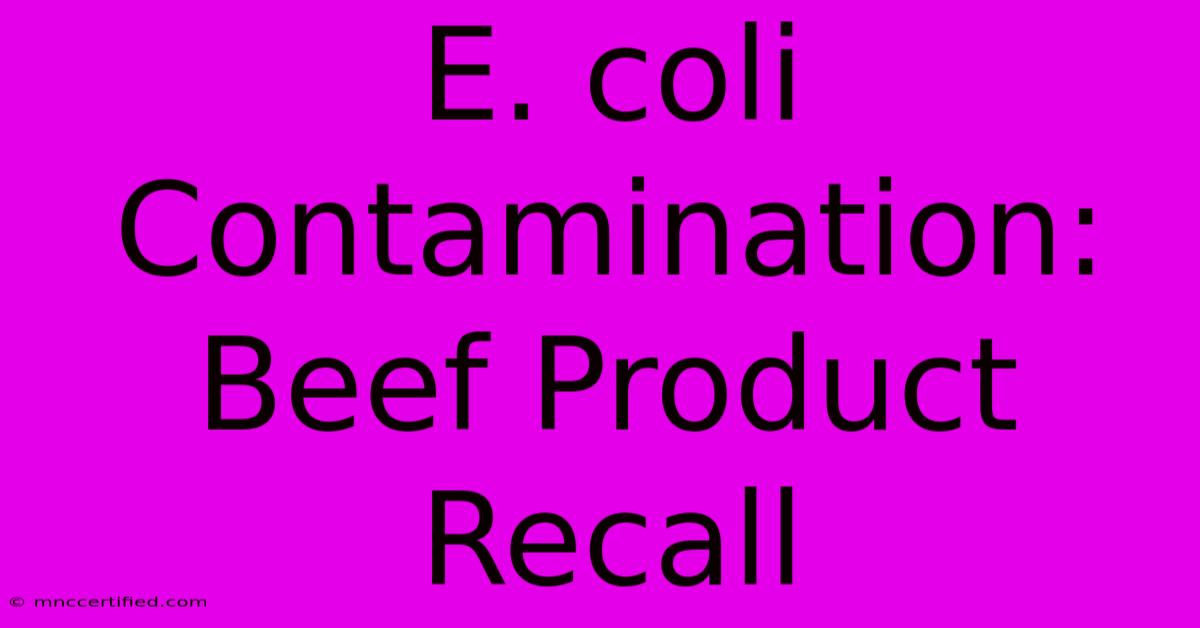E. Coli Contamination: Beef Product Recall

Table of Contents
E. coli Contamination: Understanding Beef Product Recalls
E. coli contamination in beef products is a serious public health concern, leading to frequent recalls that impact consumers and the food industry. Understanding the causes, risks, and preventative measures surrounding these recalls is crucial for both producers and consumers. This comprehensive guide explores the intricacies of E. coli contamination in beef, providing valuable insights into this critical issue.
What is E. coli and Why is it Dangerous?
Escherichia coli (E. coli) is a type of bacteria commonly found in the intestines of humans and animals. Most strains are harmless, aiding in digestion. However, some strains, such as E. coli O157:H7, are pathogenic, producing toxins that cause severe illness. These pathogenic strains can contaminate beef during processing or through fecal contamination in the environment.
Key Dangers of E. coli Contamination:
- Hemolytic Uremic Syndrome (HUS): A severe complication of E. coli infection, HUS can cause kidney failure, especially in children and the elderly.
- Bloody Diarrhea: A characteristic symptom of E. coli infection.
- Severe Abdominal Cramps: Intense stomach pain accompanies the infection.
- Vomiting: Often a symptom, particularly in the early stages.
- Fever: Although not always present, a fever can indicate a severe infection.
These symptoms can range from mild to life-threatening, highlighting the critical need for swift action when E. coli contamination is suspected.
How Does E. coli Contaminate Beef?
E. coli contamination in beef can occur at various points along the production chain:
On the Farm:
- Fecal Contamination: Cattle can carry E. coli in their intestines. Improper sanitation practices on farms can lead to fecal contamination of the meat during slaughter.
- Contaminated Water Sources: If cattle drink contaminated water, the bacteria can enter their systems.
During Processing:
- Cross-Contamination: Improper handling and sanitation during processing can lead to cross-contamination from infected surfaces or equipment to the beef.
- Insufficient Cooking Temperatures: Inadequate cooking temperatures do not kill the bacteria, increasing the risk of infection.
What to Do During a Beef Product Recall
A beef product recall, announced by the USDA's Food Safety and Inspection Service (FSIS), demands immediate action. Here's what to do:
- Check the Recall Notice: Carefully review the recall notice, noting the specific products affected, including brand names, production dates, and establishment numbers (typically found on the package).
- Locate the Product: Thoroughly check your refrigerator and freezer for any affected beef products.
- Discard the Product: Do not consume the recalled product. Discard it immediately in a sealed container, away from other food items.
- Clean Thoroughly: Clean any surfaces that may have come into contact with the recalled product with hot, soapy water.
- Contact the Company: Contact the company that produced the recalled product if you have questions or concerns.
Preventing E. coli Contamination: Best Practices
Preventing E. coli contamination requires a multi-faceted approach:
- Safe Food Handling: Always practice proper hygiene when handling raw beef, including washing hands thoroughly before and after handling.
- Thorough Cooking: Cook beef to an internal temperature of 160°F (71°C) to kill E. coli bacteria. Use a food thermometer to ensure accurate temperature.
- Safe Storage: Store raw beef separately from other foods to prevent cross-contamination.
- Source Your Beef Carefully: Choose beef from reputable sources known for their stringent food safety practices.
Conclusion: Protecting Yourself from E. coli
E. coli contamination in beef is a serious threat, but through careful awareness, diligent food safety practices, and prompt action during recalls, we can significantly reduce the risk. By understanding the causes, symptoms, and prevention methods, both consumers and the food industry can work together to ensure safer beef products for everyone. Remember to always stay informed about current food safety news and advisories.
Keywords: E. coli contamination, beef recall, food safety, USDA, FSIS, food poisoning, Hemolytic Uremic Syndrome (HUS), foodborne illness, beef safety, food handling, cooking temperature, E. coli O157:H7, beef product recall, recall notice.

Thank you for visiting our website wich cover about E. Coli Contamination: Beef Product Recall. We hope the information provided has been useful to you. Feel free to contact us if you have any questions or need further assistance. See you next time and dont miss to bookmark.
Featured Posts
-
False Insurance Claim Against Me
Nov 22, 2024
-
Bart Simpsons Voice Pamela Hayden
Nov 22, 2024
-
Non Owner Car Insurance Oklahoma
Nov 22, 2024
-
Linda Nolan On Coleens Biggest Mistake
Nov 22, 2024
-
Pete Wicks And Maura Higgins Relationship Over
Nov 22, 2024